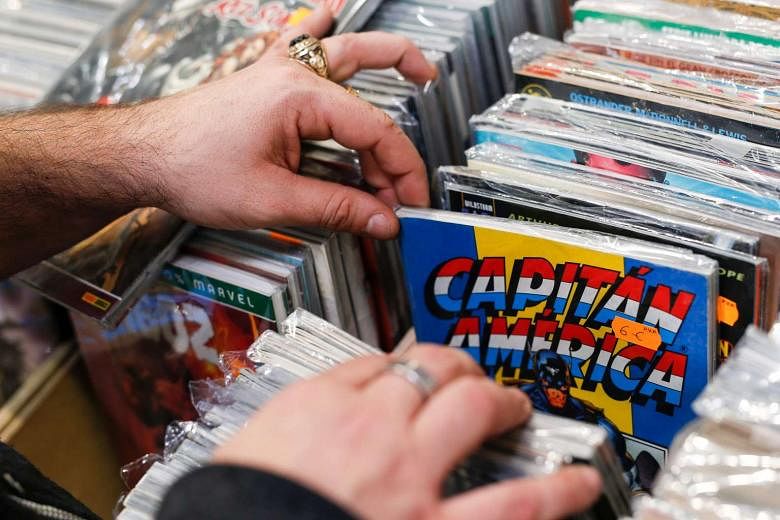NEW YORK • By the mighty hammer of Thor, it has not been a good week for Marvel Comics.
The company has taken a beating on social media and in the news since one of its executives seemingly linked poor sales to a lack of enthusiasm for newer characters who were female or had more diverse backgrounds, such as a black Captain America, a Korean- American Hulk or a female Thor.
While "Marvel Blames Diversity" makes for a juicy headline, the issue is more nuanced.
As Mr Brian Hibbs, owner of the two Comix Experience stores in San Francisco, said in an interview, Marvel has recently been experiencing a "massive sales slump" because of more basic factors: the frequent restarting of series with new No. 1 issues; fan fatigue over storylines that promise changes, but fail to deliver; and the introduction of a deluge of new series. There is also the expense of comic collecting.
This month, for instance, Marvel began rolling out a revamped line-up of X-Men titles, which will result in seven new series - two of which will publish twice a month, the other five are monthly publications.
That is a lot of comic books and they run an average of US$3.99 (S$5.60) each.
The first issues will sell well, thanks to the multiple covers and the collector's tendency to buy them all. But subsequent issues are expected to follow the industry pattern of lower sales over time.
Marvel does not have "more than one or two comics selling 60,000 or 70,000 copies," Mr Hibbs said, adding that this trend has nothing to do with "this diversity canard".
Marvel's slump began in October.
The company's average market share from that month through February was 37 per cent, a drop of 4.8 percentage points when compared with October 2015 through February last year.
By comparison, the average market share for DC Comics for October through this February was about 29 per cent, almost 4 percentage points higher than that same period the previous years.
The falloff for Marvel was one reason the company held a two-day meeting with retailers last week, which led to the diversity firestorm.
Asked about the tastes of Marvel's readership, Mr David Gabriel, the company's vice-president for sales, said: "What we heard was that people didn't want any more diversity."
The statement went viral and though Mr Gabriel tried to clarify his comments and signal Marvel's commitment to diversity, coverage of his remarks ran in Entertainment Weekly, The Guardian, Breitbart and many other media outlets.
The Telegraph of London said that the comments "remain a troubling example of the struggles facing storytelling that places non-white faces" at the forefront.
The outcry is not a surprise.
Diversity "is a hot topic in culture, pop culture and geek culture; it is understandable that there is a reaction", said Mr Milton Griepp, chief executive of ICv2, an online trade publication that covers the comic-book industry.
He attended the meeting, which included representatives of 14 retail organisations that are among Marvel's top 300 comic-book sellers. But only two of the representatives remarked that comics with non- white lead characters did not sell well for them, he said. A majority noted that those titles were bringing in new readers.
Executives at Marvel Comics did not respond to requests for an interview this week.
It is difficult to judge the popularity of the newly conceived characters based on the sales figures alone because so many heroes make the leap to television and film.
In February, Ms. Marvel, about Kamala Khan, a teenage Muslim girl living in Jersey City, New Jersey, sold an estimated 19,870 copies.
It landed at 109 out of the top 300 comics for the month. But the series is known to be doing well digitally and with collected editions.
There are also other signs of prestige. This week, a collected edition of the series, Ms. Marvel: Super Famous, written by G. Willow Wilson and illustrated by Takeshi Miyazawa, was nominated for a Hugo Award, which is given to the best science-fiction or fantasy stories.
Wilson had a lot to say about the Marvel diversity firestorm on her blog, including one critical point that complicates the situation for legacy characters such as the female Thor. She noted that they might be better embraced if the original hero had not been humiliated in the process.
Case in point: It is hard right now to root for Steve Rogers, the original Captain America, thanks to cosmic shenanigans that have reimagined him as a long-time agent of Hydra, a Nazi-like organisation.
On the same day in May that Rogers was revealed to be a villain - however long that will last - DC Comics went the opposite way.
The company published Rebirth, in which many heroes who had been pushed aside during a 2011 reboot returned. The reboot focused on new versions of the company's characters at the beginning of their careers. Since Rebirth, the DC universe has been more hopeful.
There is also a sense of optimism that runs through Ms. Marvel, but there is no clear formula that resulted in its success. It depicts heroics, teen angst and struggles for assimilation.
Willow posits that the comic's mix of traditionalist faith and social justice struck a chord with readers. What she is clear about, however, is the use of the "diversity" label.
"Let's scrap the word diversity entirely and replace it with authenticity and realism," she posted.
NYTIMES

